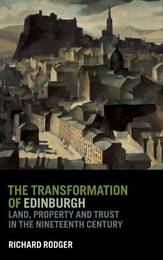
|
The Transformation of Edinburgh: Land, Property and Trust in the Nineteenth Century
Hardback
Main Details
| Title |
The Transformation of Edinburgh: Land, Property and Trust in the Nineteenth Century
|
| Authors and Contributors |
By (author) Richard Rodger
|
| Physical Properties |
| Format:Hardback | | Pages:562 | | Dimensions(mm): Height 229,Width 152 |
|
| Category/Genre | British and Irish History
World history - c 1750 to c 1900
Economic history |
|---|
| ISBN/Barcode |
9780521780247
|
| Classifications | Dewey:941.34081 |
|---|
| Audience | | Professional & Vocational | | General | |
|---|
| Illustrations |
21 Maps; 59 Halftones, unspecified
|
|
Publishing Details |
| Publisher |
Cambridge University Press
|
| Imprint |
Cambridge University Press
|
| Publication Date |
25 October 2001 |
| Publication Country |
United Kingdom
|
Description
This clear and lucid study explores the physical transformation of Edinburgh in the nineteenth century. It is based on a formidable amount of new archival research and enriched with fascinating illustrative material. In a powerful analysis of how the law adapted under intense pressure from institutions and individuals to new possibilities for profit, Richard Rodger shows how urban expansion was financed. Victorian 'feudalism', he argues, was reasserted. As a consequence, durable housing was created, though at densities and at costs which had adverse consequences for the tenement dwellers within. Trusts, educational endowments and the Church were each instrumental in this process. The urban environmental damage associated with intensive building and overcrowding is also explored, as are the public health and co-operative responses which they prompted. Historians - whether political, urban, economic, social or legal - will find challenging new insights here, which have a resonance far beyond the confines of one city. Winner of the 2003 Frank Watson Prize.
Author Biography
Richard Rodger is Professor of Urban History at Leicester University and Director of the Centre for Urban History. He teaches courses in economic and social history and is interested in the application of computing to historical analysis. He has written or edited ten books on the economic, social and business history of cities, including Scottish Housing in the Twentieth Century (1989), European Urban History (1993) and Housing in Urban Britain 1780-1914 (1995). Since 1987 Richard Rodger has been Editor of Urban History (published by Cambridge University Press).
Reviews'A unique undertaking ... by any standards a remarkable piece of scholarship.' Stana Nenadic, H-Urban 'This is the most important book on post-1760 Edinburgh since A. J. Youngson's The Making of Classical Edinburgh (1966) ... Rodger takes us on a fascinating journey.' John Byrom 'This is a path-breaking book that demands to be read, and re-read, by all those with a serious interest in the material life and culture of the nineteenth and early twentieth-century British, European, and North American city.' Bill Luckin, The American Historical Review 'Richard Rodger's book is a real work of art as well as of devoted craft. It is not simply an economic history, but a cultural account too. The whole is presented in a highly readable form, with superb illustrations, maps and diagrams ...'. Scottish Affairs 'A massive amount of archival material is used alongside official reports and contemporary newspaper/journal articles, to present a comprehensive account of the impact of Victorian landlordism, and the reinvention account of feudalism, on Edinburgh society. Rodger expertly brings out the complexities involved in private development in land, and the relationship between landlords and tenants, and his case studies of individual suburbs - especially that of Dalry - give further illustrations for the reader, and demonstrate once more the relevance of the late-century land reformers to the Scottish urban population. ... the clarity of the narrative, and the supporting illustrations, ensures that the reader's attention is kept throughout. The Transformation of Edinburgh should not only be required reading for social and urban historians, but also for the municipal powers-that-be in modern day cities.' Scottish Economic and Social History '... impressively illustrated and littered with helpful tables, charts, and maps, which offer the reader significant assistance ...'. Business History Review 'This book will clearly constitute essential reading for British urban historians, but its significance extends also to those with an interest in the legal, social and economic ramifications of urban growth in the nineteenth century. Based on a formidable body of archival research this volume marks a major new contribution to the study of British urbanisation from the perspective of land and property development, and may well provide a model for future town and city studies.' Constitution History 'The work is original and unlikely to be superseded ... This work should be in every university library and on the shelves of scholars of nineteenth-century cities.' Economic History Review 'This is the most important book since A. J. Youngson's The Making of Classical Edinburgh and in its breadth and depth of coverage, sophisticated arguments and mastery of difficult primary sources, may be said to exceed the achievement of that pioneering work.' Book of the Old Edinburgh Club 'Richard Roger has written a marvellous book showing just how complex and implicit trust relationships usually are, in this case in the building of a great city.' Urban History '...Rodger's book offers fascination through its detailed research and thoughtful insights ... One of the great delights of the book is the numerous strands within the major themes.' Urban Morphology 'It is evident that all of Edinburgh's major archives have been fully exploited in the production of this work, and that the research included is freshly culled. This book is the definite statement on building and property development in Edinburgh within this period and will remain so for many years to come.' Journal of Urban History
|